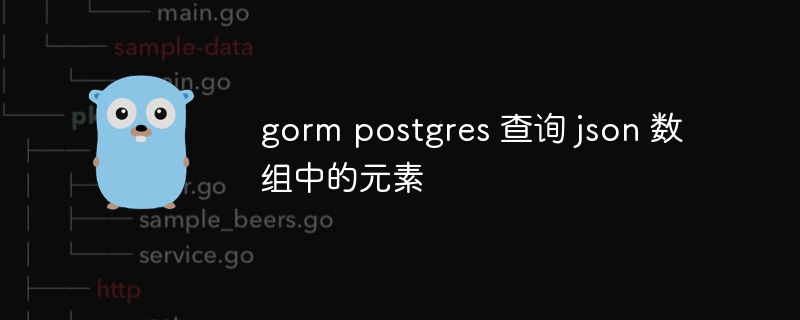Gorm Postgres fragt Elemente im JSON-Array ab

gorm postgres Das Abfragen von Elementen in einem JSON-Array ist ein häufiger Bedarf, insbesondere beim Umgang mit komplexen Datenstrukturen. Wenn wir GORM für Datenbankabfragen verwenden, können wir dieses Ziel durch einige Techniken erreichen. In diesem Artikel zeigen wir Ihnen, wie Sie Elemente in einem JSON-Array mithilfe der GORM- und Postgres-Datenbank abfragen. Unabhängig davon, ob Sie Anfänger oder erfahrener Entwickler sind, bietet Ihnen dieser Artikel detaillierte Anleitungen, die Ihnen bei der einfachen Lösung dieses Problems helfen. Lasst uns beginnen!
Frageninhalt
In meinem Golang-Projekt verwende ich Postgres mit Gorm und ich habe eine Attributspalte mit dem folgenden JSON:
{"email": ["[email protected]", "[email protected]", "[email protected]"], "mail_folder": "some_folder"}
{"email": ["[email protected]", "[email protected]", "[email protected]"], "mail_folder": "some_folder"}Ich brauche also den Datensatz mit der E-Mail [email protected], der der erste Datensatz ist. Ich kann es mit reinem SQL im SQL-Editor mit der folgenden Abfrage extrahieren:
select * from authors a where attributes @> '{"email": ["[email protected]"]}';Aber in Gorm bekomme ich immer wieder schlechte JSON-Syntaxfehler usw. Ich habe versucht, die Abfrage raw() oder
zu verwendenWhere(fmt.Sprintf("attributes ->> 'email' = '[\"%v\"]'", email)).Aber es funktioniert auch nicht. Irgendwelche Ideen, wie man das Problem beheben kann, wären willkommen. Danke.
Lösung
sampledb in postgresql:
create table authors
(
id serial,
dummy text,
attributes jsonb
);
insert into authors (dummy, attributes)
values ('eee', '{
"email": [
"<a href="https://www.php.cn/link/89fee0513b6668e555959f5dc23238e9" class="__cf_email__" data-cfemail="0762626247646464296464">[email protected]</a>",
"<a href="https://www.php.cn/link/89fee0513b6668e555959f5dc23238e9" class="__cf_email__" data-cfemail="bccececefcdedede92dfdf">[email protected]</a>",
"<a href="https://www.php.cn/link/89fee0513b6668e555959f5dc23238e9" class="__cf_email__" data-cfemail="5d2929291d3e3e3e732727">[email protected]</a>"
],
"mail_folder": "some_folder"
}'),
('zzz', '{
"email": [
"<a href="https://www.php.cn/link/89fee0513b6668e555959f5dc23238e9" class="__cf_email__" data-cfemail="0e7474744e6d6d6d206d6d">[email protected]</a>",
"<a href="https://www.php.cn/link/89fee0513b6668e555959f5dc23238e9" class="__cf_email__" data-cfemail="b3d2d2d2f3d1d1d19dd0d0">[email protected]</a>",
"<a href="https://www.php.cn/link/89fee0513b6668e555959f5dc23238e9" class="__cf_email__" data-cfemail="a7c5c5c5e7c4c4c489dddd">[email protected]</a>"
],
"mail_folder": "some_folder"
}');Das funktioniert gut:
package main
import (
"fmt"
postgres2 "github.com/jinzhu/gorm/dialects/postgres"
"gorm.io/driver/postgres"
"gorm.io/gorm"
"log"
)
var (
dsn = "host=localhost user=postgres password=secret dbname=sampledb port=5432 sslmode=disable TimeZone=europe/istanbul"
)
type Author struct {
Id int `gorm:"primaryKey"`
Dummy string
Attributes postgres2.Jsonb `gorm:"type:jsonb;default:'{}'"`
}
var DB *gorm.DB
func main() {
DB = initDb()
listAuthors()
}
func listAuthors() {
var authors []Author
DB.Find(&authors, "attributes @> '{\"email\": [\"<a href="https://www.php.cn/link/89fee0513b6668e555959f5dc23238e9" class="__cf_email__" data-cfemail="95f0f0f0d5f6f6f6bbf6f6">[email protected]</a>\"]}'")
for _, a := range authors {
fmt.Printf("%d %s %s\n", a.Id, a.Dummy, a.Attributes)
}
}
func initDb() *gorm.DB {
db, err := gorm.Open(postgres.Open(dsn))
if err != nil {
log.Fatal("couldn't connect to db")
}
return db
}Für den Beispieldatendruck:
1 eee {{"email": ["[email protected]", "[email protected]", "[email protected]"], „mail_folder“: „some_folder“}}
Das obige ist der detaillierte Inhalt vonGorm Postgres fragt Elemente im JSON-Array ab. Für weitere Informationen folgen Sie bitte anderen verwandten Artikeln auf der PHP chinesischen Website!

Heiße KI -Werkzeuge

Undresser.AI Undress
KI-gestützte App zum Erstellen realistischer Aktfotos

AI Clothes Remover
Online-KI-Tool zum Entfernen von Kleidung aus Fotos.

Undress AI Tool
Ausziehbilder kostenlos

Clothoff.io
KI-Kleiderentferner

AI Hentai Generator
Erstellen Sie kostenlos Ai Hentai.

Heißer Artikel

Heiße Werkzeuge

Notepad++7.3.1
Einfach zu bedienender und kostenloser Code-Editor

SublimeText3 chinesische Version
Chinesische Version, sehr einfach zu bedienen

Senden Sie Studio 13.0.1
Leistungsstarke integrierte PHP-Entwicklungsumgebung

Dreamweaver CS6
Visuelle Webentwicklungstools

SublimeText3 Mac-Version
Codebearbeitungssoftware auf Gottesniveau (SublimeText3)

Heiße Themen
 1376
1376
 52
52
 Was sind die Schwachstellen von Debian Openensl
Apr 02, 2025 am 07:30 AM
Was sind die Schwachstellen von Debian Openensl
Apr 02, 2025 am 07:30 AM
OpenSSL bietet als Open -Source -Bibliothek, die in der sicheren Kommunikation weit verbreitet sind, Verschlüsselungsalgorithmen, Tasten und Zertifikatverwaltungsfunktionen. In seiner historischen Version sind jedoch einige Sicherheitslücken bekannt, von denen einige äußerst schädlich sind. Dieser Artikel konzentriert sich auf gemeinsame Schwachstellen und Antwortmaßnahmen für OpenSSL in Debian -Systemen. DebianopensL Bekannte Schwachstellen: OpenSSL hat mehrere schwerwiegende Schwachstellen erlebt, wie z. Ein Angreifer kann diese Sicherheitsanfälligkeit für nicht autorisierte Lesen sensibler Informationen auf dem Server verwenden, einschließlich Verschlüsselungsschlüssel usw.
 Wie verwenden Sie das PPROF -Tool, um die Go -Leistung zu analysieren?
Mar 21, 2025 pm 06:37 PM
Wie verwenden Sie das PPROF -Tool, um die Go -Leistung zu analysieren?
Mar 21, 2025 pm 06:37 PM
In dem Artikel wird erläutert, wie das PPROF -Tool zur Analyse der GO -Leistung verwendet wird, einschließlich der Aktivierung des Profils, des Sammelns von Daten und der Identifizierung gängiger Engpässe wie CPU- und Speicherprobleme.Character Count: 159
 Wie schreibt man Unit -Tests in Go?
Mar 21, 2025 pm 06:34 PM
Wie schreibt man Unit -Tests in Go?
Mar 21, 2025 pm 06:34 PM
In dem Artikel werden Schreiben von Unit -Tests in GO erörtert, die Best Practices, Spottechniken und Tools für ein effizientes Testmanagement abdecken.
 Welche Bibliotheken werden für die Operationen der schwimmenden Punktzahl in Go verwendet?
Apr 02, 2025 pm 02:06 PM
Welche Bibliotheken werden für die Operationen der schwimmenden Punktzahl in Go verwendet?
Apr 02, 2025 pm 02:06 PM
In der Bibliothek, die für den Betrieb der Schwimmpunktnummer in der GO-Sprache verwendet wird, wird die Genauigkeit sichergestellt, wie die Genauigkeit ...
 Was ist das Problem mit Warteschlangen -Thread in Go's Crawler Colly?
Apr 02, 2025 pm 02:09 PM
Was ist das Problem mit Warteschlangen -Thread in Go's Crawler Colly?
Apr 02, 2025 pm 02:09 PM
Das Problem der Warteschlange Threading In Go Crawler Colly untersucht das Problem der Verwendung der Colly Crawler Library in Go -Sprache. Entwickler stoßen häufig auf Probleme mit Threads und Anfordern von Warteschlangen. � ...
 Wie geben Sie Abhängigkeiten in Ihrer Go.Mod -Datei an?
Mar 27, 2025 pm 07:14 PM
Wie geben Sie Abhängigkeiten in Ihrer Go.Mod -Datei an?
Mar 27, 2025 pm 07:14 PM
In dem Artikel werden die Verwaltungs -Go -Modulabhängigkeiten über Go.mod erörtert, die Spezifikationen, Aktualisierungen und Konfliktlösung abdecken. Es betont Best Practices wie semantische Versioning und reguläre Updates.
 Wie verwenden Sie tabelgesteuerte Tests in Go?
Mar 21, 2025 pm 06:35 PM
Wie verwenden Sie tabelgesteuerte Tests in Go?
Mar 21, 2025 pm 06:35 PM
In dem Artikel werden mit Tabellensteuerungstests in GO eine Methode mit einer Tabelle mit Testfällen getestet, um Funktionen mit mehreren Eingaben und Ergebnissen zu testen. Es zeigt Vorteile wie eine verbesserte Lesbarkeit, verringerte Vervielfältigung, Skalierbarkeit, Konsistenz und a
 Ist es vielversprechender, Java oder Golang von Front-End zu Back-End-Entwicklung zu verwandeln?
Apr 02, 2025 am 09:12 AM
Ist es vielversprechender, Java oder Golang von Front-End zu Back-End-Entwicklung zu verwandeln?
Apr 02, 2025 am 09:12 AM
Backend Learning Path: Die Erkundungsreise von Front-End zu Back-End als Back-End-Anfänger, der sich von der Front-End-Entwicklung verwandelt, Sie haben bereits die Grundlage von Nodejs, ...




